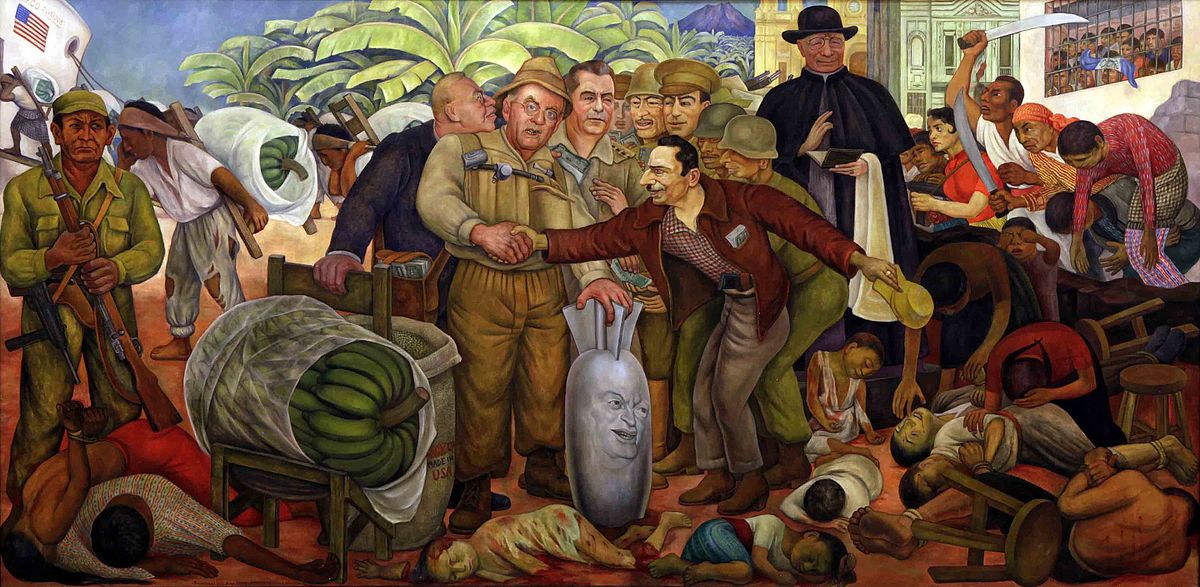Guatemala has elected Alejandro Giammattei as its new president. The president elect opposes the “safe third country” deal with the United States that current president, Jimmy Morales, agreed to. Only time will tell if Giammattei sheds his campaign opinions in order to match his new environment. Though the odds are that this deal will not be reneged given Guatemala’s history of submission to the US.
Guatemala commenced its era as a banana republic at the beginning of the twentieth century. United Fruit Company’s concessions were briefly interrupted with a mid century military coup that resulted in land redistribution to indigenous Mayans, people whose ancestral domain was appropriated by the Conquistadors. This interruption lasted only two years because in the age of McCarthyism and Red Scare United Fruit found no difficulty lobbying the US government to be their henchman. In 1954 the CIA, under the direction of Allen Dulles, also a board member of United Fruit, ousted the democratically elected president, Jacobo Árbenz, under the pretext that Árbenz was a communist.
The US intervention prompted a civil war in Guatemala that lasted over 36 years. During this period the US government supported a string of military dictators who carried out the repression and genocide of the indigenous Mayans. US Census statistics of 1960 through 1990 reflect that at least 220,000 Guatemalans were able to flee the atrocities by immigrating to the US. (1) The civil war ended in 1996 and democratic elections were reinstated. However, the impact is still being suffered today. Economic recovery has been stagnant. According to the CIA more than half the population is below the poverty line and there is a significant reliance on expatriate remittances. The indigenous who are 40% of the population suffer higher rates of poverty than the national average and 40% of the indigenous live in extreme poverty. Additionally, Guatemala suffers the highest malnutrition rate in the world. (2)
The Guatemalan government provides compulsory education through sixth grade. The Mayans lack of financial ability to continue their education is clearly evident. The National Institute of Statistics for Guatemala reports that the average years of schooling for the indigenous population was four years in 2014. (3) The education that they do receive is less than exemplary because the government is unable to recruit competent teachers in impoverished areas. Indigenous people who were unable to escape the country relocated to the isolated and undeveloped mountains in the north west and continue to live in this area. Free market enterprise such as oil and mining entice labor to relocate to the wilderness with big fat paychecks and organize the infrastructure and logistics to deliver big fat steaks. The government’s tools of the money printing press and taxation aren’t sustainable to offer such handsome compensation over the long term. Nobody wants to be stranded on a mountain with only beans and tortillas for food, and the government suffers no consequence for poor customer service of sub-par teachers. The resulting consequences are literacy rates below 75% in the western highlands (4), a dismal literacy rate of 61.7% for the population in extreme poverty, (5) and nearly one fourth of the Mayan population who do not speak the national language, Spanish. (6)
In 1999 Bill Clinton acknowledged the error of the US role in Guatemala’s atrocities. The president declared that the US must not repeat this mistake. Clearly, though, this apology was not sincere. The sociopaths were caught with their hand in the cookie jar with the release of the Guatemala Truth Commission report which stated that 200,000 people died. Clinton’s mea culpa was merely a public relations curtain that shielded the war hawks while they continue the task of empire building. “We shouldn’t have been there in the first place, but we can’t leave now” is an overused justification for intervention that Americans need to reject. The invaded will not dare to revolt under threat of tariffs, sanctions and embargoes. The American people need to demand that their government practice the golden rule and leave the rest of the world to self determination.
Adice Lyneis is a twelve year volunteer for a charitable organization that assists communities in the Huehuetenengo department of Guatemala. Her most recent visit to Guatemala was in May 2019.
2 https://www.cia.gov/library/publications/the-world-factbook/geos/gt.html economy overview
3 – 6 https://www.ine.gob.gt/sistema/uploads/2016/02/03/bWC7f6t7aSbEI4wmuExoNR0oScpSHKyB.pdf
3 Page 209
4 Page 199, light purple areas are the departments that have significant indigenous population
5 Page 200
6 Page 25
































